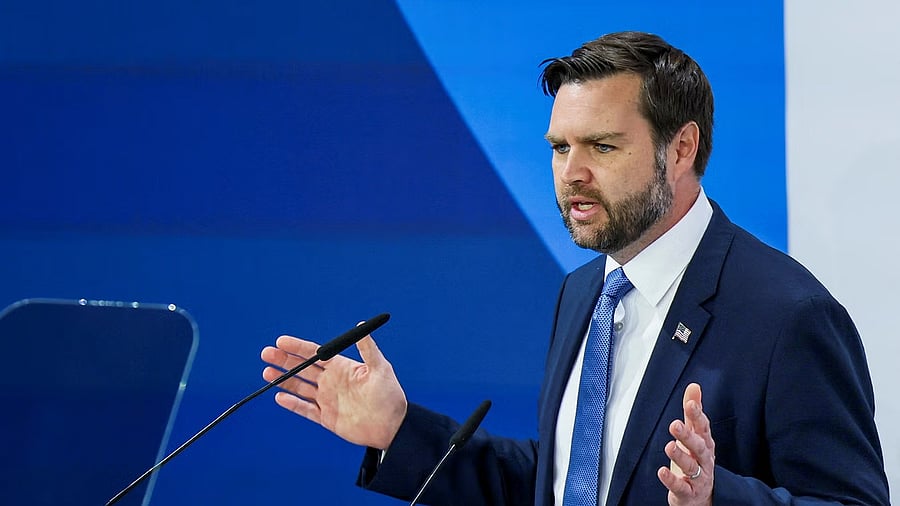
US Vice President JD Vance
Credit: Reuters photo
New Delhi: The United States has subtly asked India to avoid a military conflict with Pakistan while responding to the April 22 terrorist attack at Baisaran near Pahalgam in Jammu and Kashmir.
“We’ve obviously been in close contact with our friends in India and Pakistan. Our hope here is that India responds to this terrorist attack in a way that does not lead to a broader regional conflict,” US Vice President J D Vance told Fox News late on Thursday.
He was responding to a query on the escalation of tensions between New Delhi and Islamabad in the wake of the killing of 26 people in the carnage in J&K. Prime Minister Narendra Modi on April 29 gave the armed forces of India “operational freedom” to respond to the attack, which was carried out by the terrorists owing allegiance to The Resistance Force, an offshoot of Lashkar-e-Tayyiba based in Pakistan.
Vance made the comment a day after External Affairs Minister S Jaishankar received a call from US Secretary of State Marco Rubio, who asked India to work with Pakistan “to de-escalate tensions and maintain peace and security in South Asia”.
China, earlier this week, asked India and Pakistan to exercise restraint, while the US called for a “responsible resolution” to diffuse tension.
“And, we hope, frankly, that Pakistan, to the extent that they’re responsible, cooperates with India to make sure that the terrorists sometimes operating in their territory are hunted down and dealt with. That’s how we hope this unfolds, we’re obviously in close contact. We’ll see what happens,” the US vice president told the TV channel.
Vance, along with his wife and children, was on a visit to India when the latest carnage in J&K was carried out by the terrorists, who were trained in areas under illegal occupation of Pakistan.
New Delhi alleged “cross-border linkages” of the carnage as early as on April 23 and responded to it, by putting in abeyance 65-year-old India-Pakistan Indus Water Treaty (IWT), shutting down the Integrated Check Post at Attari-Wagah border between the two countries, revoking visas issued to citizens of Pakistan to visit India, and further downgrading bilateral diplomatic relations. New Delhi also expelled Pakistan’s three military officers posted as diplomats at its high commission in the capital of India.
Islamabad put in abeyance the 1972 Simla Agreement as well as all other bilateral pacts between Pakistan and India, apart from initiating other retaliatory measures to respond to New Delhi’s moves. They also stopped allowing aircraft of India and Pakistan to fly through each other’s airspace.
When Rubio late on Tuesday told him over the phone that President Donald Trump’s administration wanted India to work with Pakistan to maintain peace in South Asia, External Affairs Minister S Jaishankar responded by stressing that the “perpetrators, backers and planners” of the attack must be brought to justice.
This was followed by Defence Minister Rajnath Singh telling his US counterpart Pete Hegseth on Wednesday that Pakistan had a history of supporting, training and funding terrorist organisations, and the world could no longer turn a blind eye to the role of the “rogue state” in fuelling global terrorism and destabilising the region. Hegseth, according to a readout issued by New Delhi, told Singh that the US stood in solidarity with India and supported India’s right to defend itself.
Hegseth’s post on X about his call with Singh, however, had no reference to Pakistan, although he did convey strong support of the US to India.
Despite the persistent refusal of Prime Minister Shehbaz Sharif’s government to acknowledge the role of the entities based in Pakistan in the latest terrorist attack in India, the Trump Administration asked New Delhi to avoid regional conflict while responding to the carnage. A source in New Delhi told DH that the US should not overlook the fact that Pakistan had never done its bit to bring to justice the plotters and perpetrators of the terror strikes in India, be it the November 26-28, 2008, carnage in Mumbai, or the attacks on the Indian Air Force base in Pathankot January 2016. Though the recent extradition of 26/11 plotter Tahawwur Rana from the US to India raised hope for stronger bilateral cooperation against terrorism, New Delhi was taken aback by the nudge from Washington, D.C. to work with Islamabad to diffuse tension.
Sharif recently said that his government was open to participating in any neutral investigation into the April 22 carnage in J&K.
New Delhi had only once in the past allowed Islamabad to take part in a probe into a terror attack in India. Prime Minister Narendra Modi’s government had in March 2016 allowed a team of investigators from Pakistan to visit the scenes of attacks that the Jaish-e-Mohammed (JeM) terrorists had carried out inside the airbase at Pathankot in India. The officials of India’s National Investigation Agency had accompanied the investigators from Pakistan during the tour to the Indian Air Force base.
The exercise, however, had not resulted in any meaningful action by Pakistan against the terrorist organisations known for carrying out attacks in India. The Indian Army, later on September 26 that year, carried out its first publicly acknowledged “surgical strikes” on the camps of the terrorists in the areas under illegal occupation of Pakistan.
